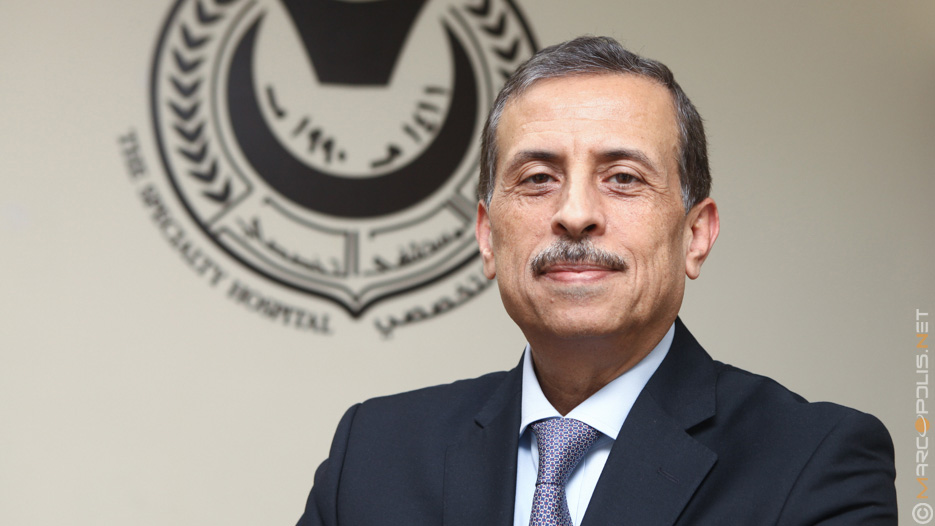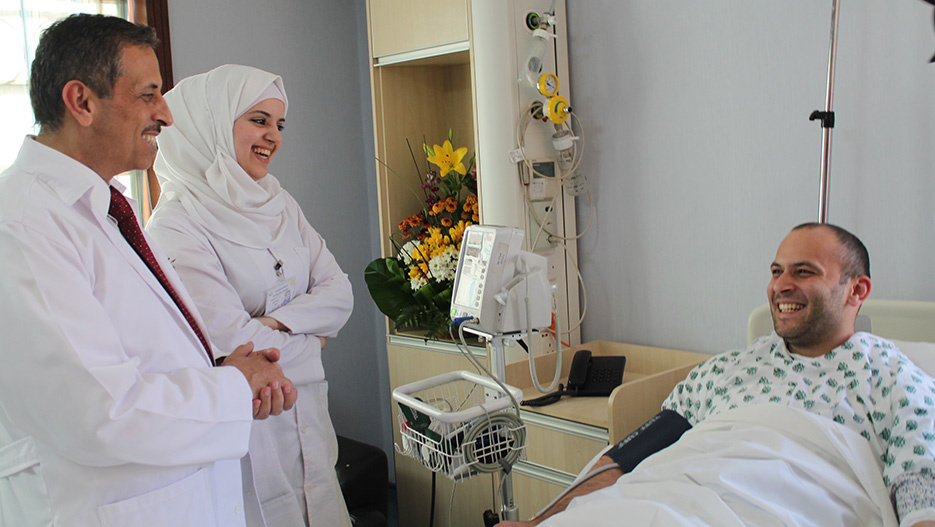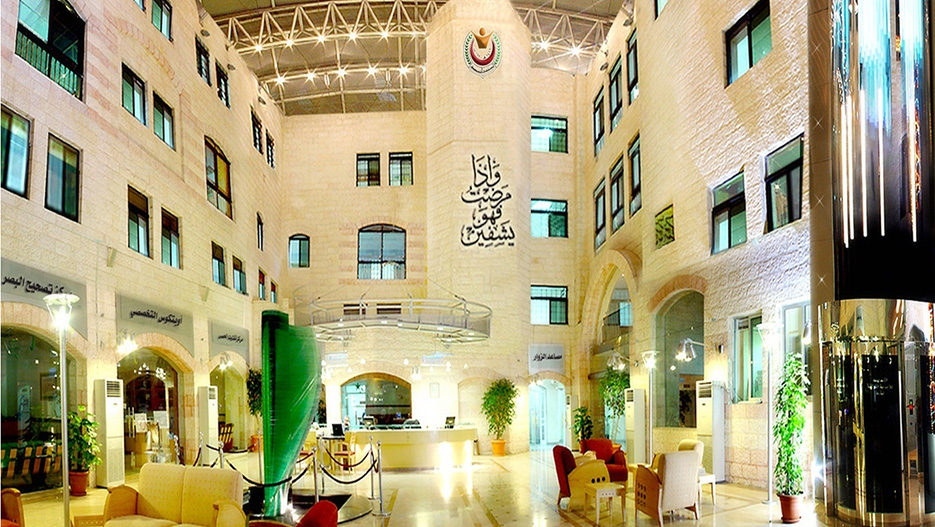Specialty Hospital, Jordan’s Top Hospital for Medical Tourism
In 2014, Jordan received more than 250,000 patients from abroad and was awarded The Best Medical Tourism Destination of the year 2014 by the International Medical Travel Journal.
Interview with Dr. Fawzi Al-Hammouri, CEO, General Manager of Specialty Hospital, Chairman of Jordan Private Hospitals Association

Give us your personal overview of the healthcare sector in Jordan? Secondly tell us about medical tourism in the kingdom.
Jordan has succeeded in having a high quality healthcare system and we have managed with limited resources to have good infrastructure both in terms of medical centres and hospitals. The investment environment in Jordan encouraged people to invest in building hospitals so more than 60% of the hospitals are private. There are very few countries in the world where you find more private hospitals than governmental hospitals. We worked hard on quality issues in Jordan and we established the accreditation body called the Health Care Accreditation Council (HCAC) and we encourage hospitals to implement standards to ensure high quality and patients’ safety. At the moment we have 17 HCAC accredited hospitals and 10 hospitals that are Joint Commission International (JCI) accredited. Jordan has succeeded in being the number one medical tourism destination in the MENA region. In 2014, we received more than 250,000 patients from abroad and we were awarded The Best Medical Tourism Destination of the year 2014 by the International Medical Travel Journal; it was awarded to us in the International Medical Travel Conference which was held in Dubai. We invested heavily in building the capacity of human resources in Jordan. We have a high number of physicians, nurses, technicians, pharmacists etc. and we have a large number of physicians compared to the population; we have more than 28 physicians per 10,000 population. This is considered one of the highest ratios in the world. Jordan is exporting physicians and medical professionals in fact. Many Jordanian doctors are working in the Gulf States and many are working in the USA or Europe.
What are the factors that influence this? Why does Jordan have such a big percentage of doctors per patients?
First of all, Jordanian people love to see their children grow up to study at university and particularly to study medicine, dentistry or pharmacy. Also the government has encouraged studying the medical specialties. There was always a demand for these specialties both in Jordan and in the neighbouring countries. All in all I think it is multifactorial. We invested in our human capital. Furthermore it is not only about building up the capacity of the people but it is also building the hospitals; we managed to build high quality hospitals that are fully equipped with the latest technology and also with the hospitality services. You will find hospitals which look like 5 star hotels. This kind of service means that many people come from abroad looking for this kind of hospitality and quality care. This encourages people to come to Jordan. At the same time, with these high quality services and care we manage to keep our prices very competitive. If you look at the prices of medical services in Jordan, they are the lowest in the world in relation to the quality. The prices are much cheaper than in the neighbouring countries and far cheaper than Europe or the USA. One of our main strengths is that we eliminated the waiting lists. The high availability of medical technologies led to no waiting time for medical services in Jordan. You can see your doctor and carry the needed diagnostic tests during the same day and sometimes you can have your surgery all within 24 hours. This is very rare anywhere in the world.

With regards to the healthcare sector, what are the challenges on the ground?
We face some challenges, mainly the brain drain. A lot of healthcare providers are leaving the country to work in other countries, particularly in the Gulf States and some of them go to the USA or Europe. We cannot compete with those countries in the salary scale. The other thing that is a challenge is what is happening in the surrounding countries like Iraq, Syria, Yemen and Libya as it is affecting the flow of patients and we depend a great deal on attending to patients from those countries.
Introduce us briefly to the hospital. How do you stand out?
The Specialty Hospital was established in 1993. We now have 265 beds and we provide a full range of medical, diagnostic and surgical services. The Specialty Hospital is recognised as the most accredited and most awarded hospital in the Arab countries. We have been awarded “The Best Patient Cantered Care Award” from the League of Arab Health Ministers and the Arab Hospitals Federation. We have focused a lot on quality care and patient safety. Also we are keen to provide the latest medical technology for our patients. So for instance we were the first hospital to provide the MRI 3 Tesla. It was a long time ago and we were the first in the Middle East. We were the first to get the lithotripsy machine called “Sonolish (i-sys)” that is distinguished in the tracking of the stones through infrared we were the first in the world.
The Specialty Hospital is devoted to enhance the medical profession that’s why it became a teaching hospital for post graduate physicians programs that is approved by the Jordanian Medical Council, The Arab Medical Council and the Royal College of OBS/GYN. We also established the Specialty Training Centre which is accredited by the American Heart Association.
The Specialty Hospital is now considered the number one hospital in Jordan in attracting medical tourism; more than 40% of our admissions are from non-Jordanians. The Specialty Hospital is now well known for certain specialties, mainly cardiovascular procedures, orthopaedic, Nephrology, Neurology and other major procedures. We are doing the largest number of paediatric congenital heart disease surgeries and we also do a lot of organ transplants, particularly kidney transplants. We carry the largest number of kidney transplants in the private sector in Jordan and we have the highest success rate; we have a more than 99% success rate in kidney transplants.
We carry the largest number of kidney transplants in the private sector in Jordan and we have the highest success rate; we have a more than 99% success rate in kidney transplants.
You stated that more than 40% of your patients are those who come for medical tourism. Apart from the surrounding region of the Gulf States, what other nationalities come for treatment?
Our patients who come from abroad mostly come from the Arab countries. We are however also attracting patients from Africa, Europe, CIS countries and even some patients from the USA and Canada.
How do they know about the Specialty Hospital? How are you promoting the hospital?
We participate in almost all conferences and exhibitions that are involved in medical tourism all over the world. Every year we have at least ten or eleven activities that we do internationally. Also we work on social media using internet marketing tools and we also have cooperation with international insurance companies, some large self-funded companies and we arrange FAM tours in which we invite delegates from targeted countries to visit Jordan and the Specialty Hospital to know more about the competitive advantages of the medical services provided.
In the near future will you be introducing any new services or opening new centres? You said you always try to be the most innovative hospital when it comes to introducing new technologies. Is there something you would like to announce?
Now we are establishing a new hospital which will be a unique medical centre that will consist of many specialised state of the art centres. Some of those will focus on wellbeing and also on women´s health and beauty. We will also have a new centre for genetic diseases and stem cell therapy. We are also planning to establish a neuro science centre which will provide both medical and surgical treatment for neuro-muscular diseases.

When will it be opened?
It will need two years from now, so most likely it shall open by the end of 2018.
What is your overall strategy for the hospital? If you position yourself one or two years from now, where would you like to see it?
We are keen to continue to be in the number one position as the most awarded and accredited hospital providing the highest quality care. We are also keen to maintain Jordan as the number one medical tourism destination in the MENA region.
Investing in hospitals is a long term investment but it is essential for the country. It is one of the most important economic pillars in the country. It is a great way of creating jobs for Jordanians, currently private hospitals have more than 35,000 Jordanians.
Over the past four years with what has happened in the Arab countries, Jordan was the safe haven for those patients and the injured that needed treatment. This is why we received 150,000 Libyans patients and more than 50,000 Syrians patients in our hospitals. We also treated a lot of Yemenis and Iraqis and other nationalities as well. We believe that Jordan played an important role in helping those countries to overcome the agony and suffering they are going through.
We recently established the air ambulance service in Jordan. The Specialty Hospital has already built a new helipad and we have managed to transfer some patients in this way for emergency evacuation. It is quite a good added value for the healthcare sector in Jordan.
FAIR USE POLICY
This material (including media content) may not be published, broadcasted, rewritten, or redistributed. However, linking directly to the page (including the source, i.e. Marcopolis.net) is permitted and encouraged.